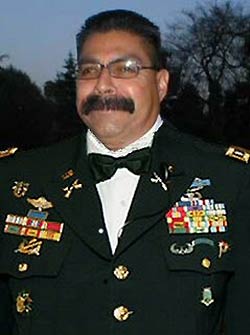Is a lie free speech? The Xavier Alvarez challenge
 TO New York, where the United States is taking on Xavier Alvarez. According to the Stolen Valor Act, it is a federal crime to claim wrongly that you have “been awarded any decoration or medal authorized by Congress for the Armed Forces of the United States, any of the service medals or badges awarded to the members of such forces, the ribbon, button, or rosette of any such badge, decoration, or medal, or any colorable imitation of such item”.
TO New York, where the United States is taking on Xavier Alvarez. According to the Stolen Valor Act, it is a federal crime to claim wrongly that you have “been awarded any decoration or medal authorized by Congress for the Armed Forces of the United States, any of the service medals or badges awarded to the members of such forces, the ribbon, button, or rosette of any such badge, decoration, or medal, or any colorable imitation of such item”.
Xavier Alvarez lied “that he rescued the American ambassador during the Iranian hostage crisis”. He lied when he said he played professional hockey and married a Mexican starlet. He added:
“I’m a retired marine of 25 years. I retired in the year 2001. Back in 1987, I was awarded the Congressional Medal of Honor. I got wounded many times by the same guy. I’m still around.”
For that lie, Alvarez earned 416 hours of community service, a fine of $5,000 and three years probation. Alvarez won an appeal. The appeal judges ruled:
We have no doubt that society would be better off if Alvarez would stop spreading worthless, ridiculous, and offensive untruths. But, given our historical skepticism of permitting the government to police the line between truth and falsity, and between valuable speech and drivel, we presumptively protect all speech, including false statements, in order that clearly protected speech may flower in the shelter of the First Amendment.
While asserting that they were not endorsing “an unbridled right to lie,” Smith and Nelson said regulations of false speech that have been upheld by the courts were limited to narrow categories where a direct and significant harm was caused. But, they said, the harm caused by people making false statements about military decorations was not evident.
So. The US took him to the Supreme Court.
The Los Angeles Times:
If Alvarez had lied about his military record to obtain money, he would have been guilty of the eminently prosecutable crime of fraud. But in itself a pathetic claim to military glory — a claim easily debunked by a visit to the Internet — isn’t the sort of statement a free society should criminalize.
Indeed. It’s pathetic.
In November of 2006, Xavier Alvarez was elected to represent the city of Pomona on the board of the Three Valleys Municipal Water District as a war hero who had been awarded the Medal of Honor.
Alvarez claimed to be a retired 25-year Marine Corps veteran, who was many times wounded and had received the nation’s highest award for military valor for serving as a helicopter pilot and rescuing US POWs from behind enemy lines during the War in Vietnam. In fact, Alvarez was never in the military, and was 17 years old when the Vietnam War ended in 1975.
Is a lie free speech:
Inside court, Alvarez’s federal public defender, Jonathan D. Libby, acknowledged to the justices that his client is a liar. But he said the Stolen Valor Act goes too far and violates the First Amendment. “The Stolen Valor Act criminalizes pure speech in the form of bare falsity, a mere telling of a lie,” Libby said. “It doesn’t matter whether the lie was told in a public meeting or in a private conversation with a friend or family member.”
A view:
If Congress can outlaw lies about receiving medals, what other lies could it criminalize? Could it be a crime to lie about one’s level of education or employment record? What about the lies an adulterer tells? We can condemn certain behavior without criminalizing the speech connected to it. The Supreme Court has already defended the right of members of the viciously anti-gay Westboro Baptist Church to picket a military funeral.
And:
This case is about theft, not lying in general,” District of Columbia lawyer Michael Morley wrote in one brief. “Alvarez, and others like him, have misappropriated for their own benefit an unearned share of the two centuries’ worth of goodwill and prestige associated with American military awards.”
Can you outlaw lying?
Posted: 27th, February 2012 | In: Reviews Comment (1) | TrackBack | Permalink


